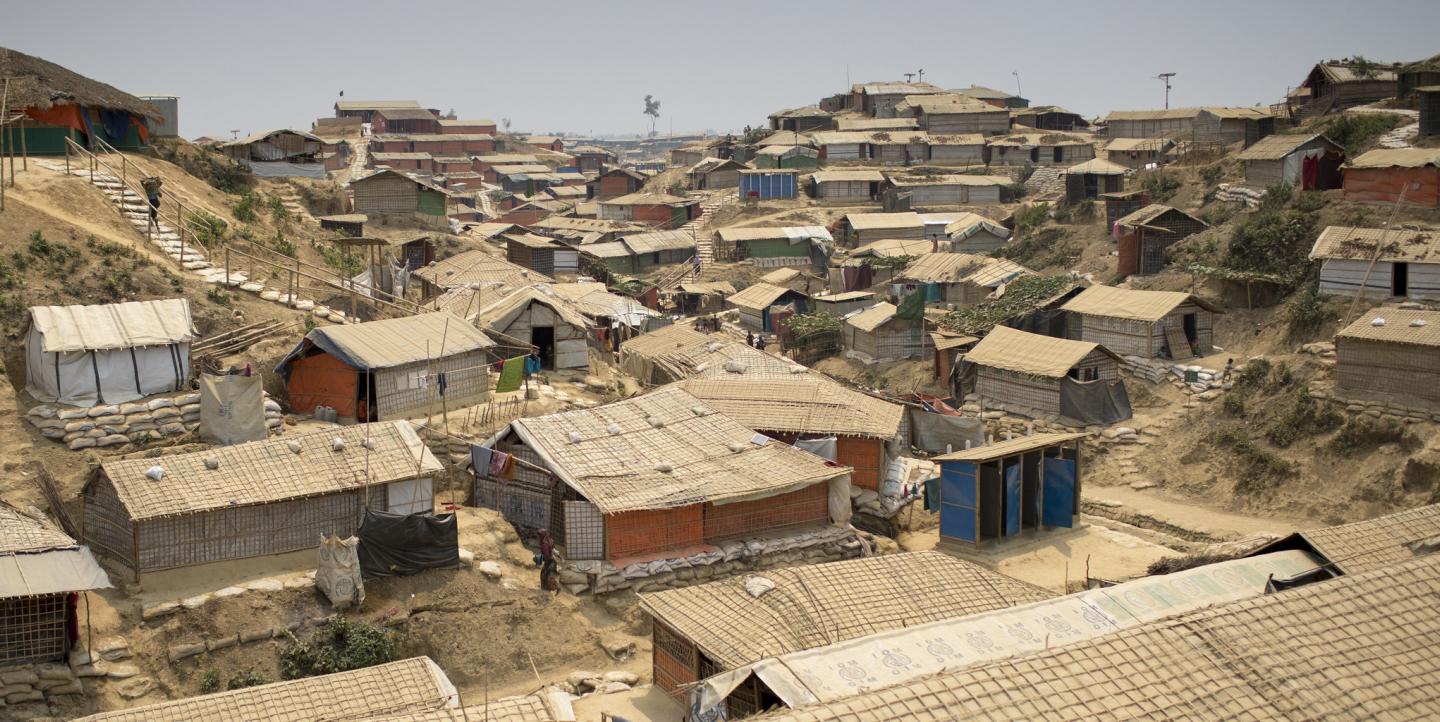In Kutupalong camp in Cox’s Bazar District, Bangladesh, a dozen men sit around a table inside a bamboo shelter. Most of them are elected members of Voice of Rohingya, one of the two largest Rohingya-led information services that operate inside the world’s most populous refugee camp.
Also at the table are two men who work for the Special Branch of the Bangladeshi police.
Surveillance is part of life for the VoR team, said a spokesperson. Along with the rest of the group, he wished to remain unnamed for safety reasons. It’s difficult, he says, but it’s still better than their previous situation. “We were voiceless for years in Myanmar,” he said.
Bangladesh recently announced new restrictions on cell phone services in the camps. The move followed a failed attempt to repatriate 3,540 refugees to Myanmar on August 22 and a surge in violence in recent weeks, with four Rohingya shot dead by police.
If imposed, the ban would leave the Rohingya even more desperate for reliable news and information. They would also be stripped, once again, of their voice.
Finding a voice
In August 2017, over 740,000 Rohingya Muslims fled a military offensive in Myanmar that the United Nations has likened to ethnic cleansing, joining some 200,000 already in refugee camps in Bangladesh.
In the two years since then, several information services and informal media organizations have been set up inside the camps, to provide daily news to a population larger than Bhutan’s.
“We were quite scared and very traumatized, and no one was standing to raise the voice of our community,” said the VoR spokesperson. “So we organised and built [our] center with the permission of the [camp leaders].”
VoR representatives said they have a network of citizen journalist volunteers in every refugee camp in Bangladesh, as well as in Myanmar’s Rakhine State, and among the global diaspora.
“They are not [trained] journalists, they are just normal people like us. Whenever anything happens they tell us,” the VoR spokesperson said.
Members of this network upload information to a WhatsApp group. The VoR team verifies it by checking with other sources in the area, and then distributes it on social media channels including Twitter and Facebook.
None of the team use their own names when they publish stories for fear of repercussions.
“We don’t have any means [of distribution] other than social media, but we still need to share the news to people among our community,” the VoR spokesperson said.
Jamtoli Information Line, a program supported by a Swiss non-profit organization Fondation Hirondelle, is another platform that provides information services to refugees, broadcasting their programs by loading them onto SD cards and then plugging them into portable speakers. Their teams manually take these common gathering areas, where they can be further disseminated via Bluetooth.
“A listening group coordinator will have the program loaded on their phone and if people want to take it away [they] can Bluetooth it and take it home to play for their family,” said Dianne Janes, Head of Project for Fondation Hirondelle.
Trained and paid refugees produce the show in Rohingya language, which is designed to provide information that can enable refugees to independently “improve their lives and to make decisions that can help themselves” Janes said.
“Each program [tackles] a topic like dengue fever outbreak, cyclone preparation, maternal health, or getting on with your neighbors. They’re all social and physical issues about life in the camps,” Janes said.
The service has always shied away from controversial topics, she said. Bangladesh, which ranks 150 out of 180 on the Reporters Without Borders’ 2019 World Press Freedom Index, is known for strict media control, having recently blocked the use of major news outlets like Al Jazeera inside the country.

Welcome wearing thin
But as the welcome for refugees wears thin and tensions between the two communities rise, refugees say they are fearful.
Refugees have limited access to radios and cannot legally own SIM cards for Bangladeshi phone networks because mobile carriers require users to register with national identity documents.
This resulted in refugees paying a local to register a SIM in their name, or getting unregistered SIMs that are valid for a short amount of time. Because of this, many Rohingya communicate through apps such as WhatsApp and Signal that allow them to keep the same phone number despite changing SIM cards. Even then, connectivity in the camp remains low, especially at night.
But with operators ordered to stop their services in the Rohingya camps, refugees may have to rely on word of mouth to learn about the forces shaping their future.
“Access to SIM cards has been a vital service for the Rohingya for years and they have utilized them extremely effectively to raise awareness of their plight to the world,” Executive Director of Burma Human Rights Network, Kyaw Win, said in a statement. “By blocking access to communication for the Rohingya, Bangladesh will effectively isolate them from the world and prevent them from engaging in basic communications they have depended on to make sure the world hears their concerns.”
This article was written with reporting from Victoria Milko.
This article was originally published by Splice. It was republished on IJNet with permission.
Clare Hammond is the digital editor at Frontier Myanmar, formerly at The Myanmar Times. Currently writing a book on railways in Myanmar.
Main image CC-licensed by Flickr via UN Civil Protection and Humanitarian Aid.

